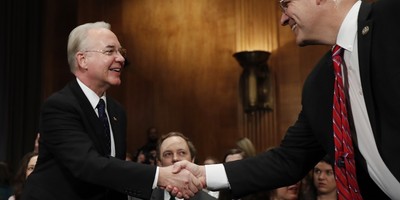Advertisement
Granted it was more than three years ago, which is a while. But since the Obama administration couldn't conjure up any more recent economic achievements to speak of, you might think they would at least remember the auto bankruptcies accurately enough to note that they were, in fact, bankruptcies.
Perhaps Democrats were desperate to manufacture a false contrast? If so it helped that they had an assist from the New York Times, which wrote the provocative headline "Let Detroit Go Bankrupt" on a 2008 op-ed by Mitt Romney that advocate a managed bankruptcy process. A more accurate headline might have been: "Let GM and Chrysler Go through a Managed Bankruptcy."
"A managed bankruptcy may be the only path to the fundamental restructuring the industry needs," Romney wrote. "In a managed bankruptcy, the federal government would propel newly competitive and viable automakers, rather than seal their fate with a bailout check."
President Bush disregarded this sensible advice, instead handing over bailout checks to General Motors, Chrysler, and their finance companies that totaled about $25 billion. When Obama took office he initially followed Bush's example rather than Romney's recommendation, forking over another $20 billion in bailout checks in a futile attempt to stave off bankruptcy.
Recommended
Advertisement
Those bailouts failed, and ultimately Chrysler and General Motors both went through managed bankruptcies - what Romney recommended. Taxpayers were out $45 billion that was wasted bailing out the pre-bankruptcy companies.
The Romney plan? "The federal government should provide guarantees for post-bankruptcy financing and assure car buyers that their warranties are not at risk." So he was on board with putting in taxpayer dollars, as long as it was to finance reorganization in bankruptcy. We know that in the bankruptcies that actually happened, that financing totaled $30 billion for General Motors and $5 billion for Chrysler.
Going directly to a managed bankruptcy rather than attempting to nurse the pre-bankruptcy companies along could have then, for $35 billion, taken us to the same place that the Bush/Obama approach cost $80 billion to reach.
There were other differences of course - mostly the sweetheart treatment the United Auto Workers got, even at the expense of senior secured creditors. Pensions for salaried workers at Delphi, the former GM parts company, were gutted while union pensions were spared. Dealers had their franchises revoked arbitrarily.
Advertisement
Under Romney the bankruptcies wouldn't have been politically rigged to benefit union bosses, and therefore could have more effectively restructured the companies.
Those differences aside, the simple fact is that the basic process Obama used after his failed bailout was precisely the managed bankruptcy Romney recommended. If it worked then Obama should thank Romney for the idea.

























Join the conversation as a VIP Member